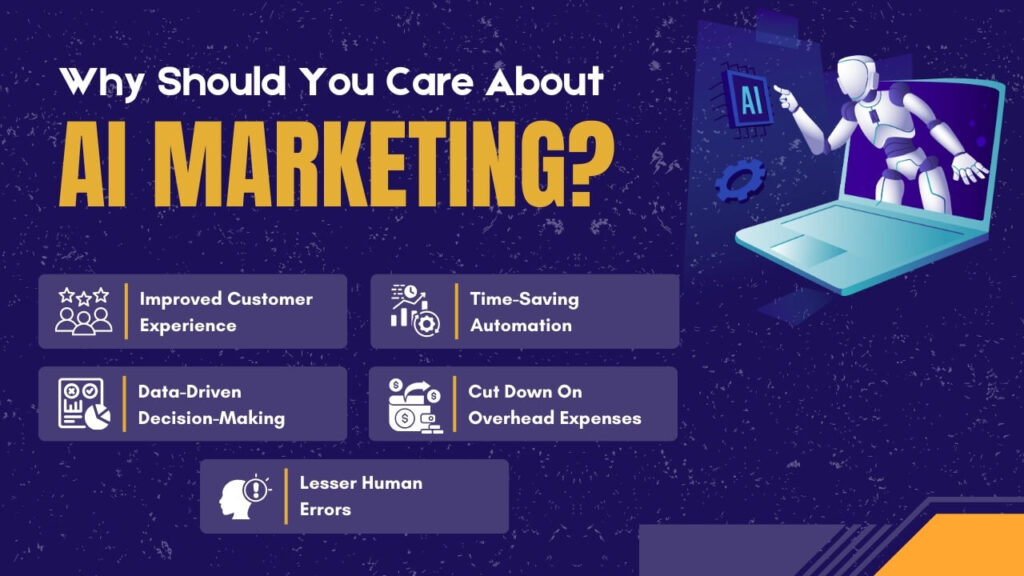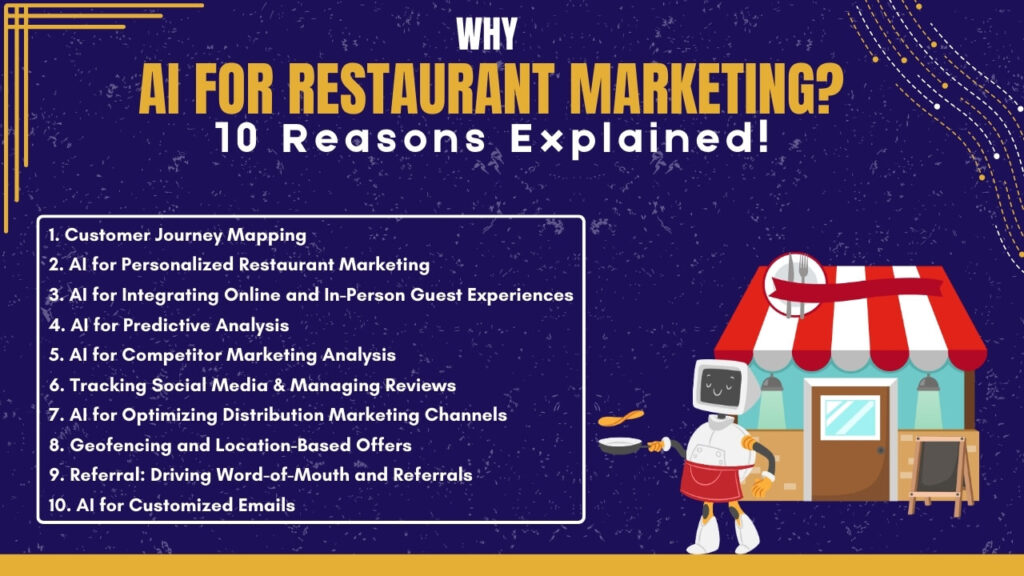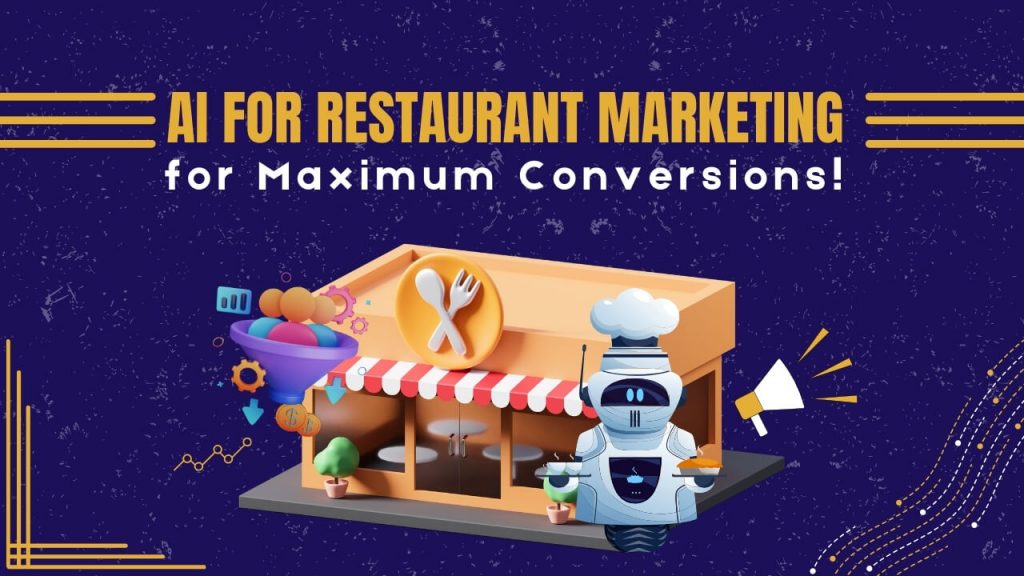Getting Started
The restaurant industry is growing at a fast pace, but so does the competition. And, it is not that easy to cope with it.
Thank you for reading this post, don't forget to subscribe!And, as the restaurant industry is becoming so competitive – it has become important for customers to be in front of their customers and find new & innovative ways to encourage them to come(again & again).
The answer to this is Marketing. But, let’s face it. Managing restaurants is quite a challenge(let alone marketing). It’s not when you have an assistant in place who can help you with comprehensive marketing and automate most of the time time-consuming tasks.
It is now possible – thanks to AI.
The right AI restaurant software for marketing can automate a lot of your daily duties, collecting and analyzing data for personalized marketing and promotions, segmenting your customer base, suggesting and producing content for various channels, developing targeted campaigns, monitoring key performance indicators (KPIs), generating reports and what not.
Let’s keep reading to understand how AI is helping restaurant businesses with marketing.
Also Read: Business Intelligence for Small Restaurants
What is AI For Restaurant Marketing?
Artificial Intelligence is a modern and sophisticated shift in the market, including marketing. AI seemed like a far-off idea not too long ago. Today, it’s nearly impossible not to hear about or interact with it. All individuals and businesses are interacting or leveraging AI in one way or the other.
AI is helping restaurant businesses through data processing and algorithmic patterns and can analyze massive amounts of data for better, targeted marketing.
As of right now, Markets and Markets estimates that the size of the AI industry will reach $407 billion by 2027.
Not just big IT giants like Microsoft and Google are benefiting from artificial intelligence. Restaurants have also begun to use artificial intelligence in novel ways.
Let’s keep reading to know how restaurants are leveraging AI for marketing.
Also Read: How to Use AI in the Restaurant Business?
Why Should You Care About AI Marketing?

You may now be asking yourself, “Why should I care about AI marketing?” Okay, let’s break it down:
1. Improved Customer Experience: AI may assist you in comprehending the preferences and behavior of your customers, which will allow you to better cater your marketing initiatives and services to their requirements. Personalized experiences make clients happier, which leads to repeat business.
2. Time-saving Automation: AI can automate a variety of tasks, like drafting and segmenting emails, posting on social media, and even replying to customer reviews. This lets you concentrate more on managing your restaurant, which is what you do best.
3. Data-driven decision-making: AI enables you to make well-informed decisions that are based on data rather than guesswork. This translates into more intelligent business marketing plans, promotions, and campaigns which leads to better results with higher conversions, sales, revenue, retention, etc.
4. Cut down on overhead expenses: With little to no human participation, AI solutions do the repetitive tasks that are essential to your business. This is advantageous for your restaurant business because it saves you money by avoiding the need to hire a team to manage your marketing procedures, and the work still gets done efficiently.
AI-powered marketing apps are especially beneficial for one-person marketing teams, since they allow the marketer to remain productive without feeling overburdened.
5. Lesser human errors: Human error accounts for so many things that can go wrong in a restaurant. And marketing is not that cheap and when these types of human errors occurs, it can lead to costly errors. You invest your crucial business resources, and you will not get the ROI you deserve for your restaurant business.
Also Read: Artificial Intelligence vs Machine Learning
Why AI for Restaurant Marketing? 10 Reasons Explained!

1. Customer Journey Mapping
Customer journey mapping is the skill of assessing a user’s interactions, perceptions of your company, and evolution. When you know all these things about your customers, you can expect to see rapid improvement in your marketing strategy and operational actions.
AI helps restaurants segment and identify their target customers, by analyzing demographic data, purchase history, and preferences. With AI, restaurants can fine-tune their offers for specific customer groups.
Example offers for target segments:
- Students: “Free fries with a sandwich” or “All-you-can-eat dishes.”
- Working professionals: “Discount on takeout orders” or participating in charity events to build goodwill.
- Both: AI can suggest general offers like BOGO (buy one, get one free) deals to attract a wider audience.
AI tools analyze past promotions, customer feedback, and engagement metrics to recommend which offers will resonate best with each segment.
2. AI for Personalized Restaurant Marketing
Personalized marketing is an important tactic for restaurant marketers looking to attract their target audience and increase sales. Restaurants can use artificial intelligence (AI) to create targeted, tailored promotions that resonate with particular customers.
Customer profiling is one method that artificial intelligence might help restaurant marketers with targeted marketing. AI can generate comprehensive customer profiles by examining information such as name, gender, location, preferences, and behaviors that offer insights into the types of content and responses that each visitor is likely to interact with.
Restaurants can use this data to craft customized marketing strategies and campaigns that cater to the unique requirements and preferences of each customer, increase revenue, and foster steadfast client loyalty.
Also Read: Business Intelligence for Restaurants
3. AI for Integrating Online and In-Person Guest Experiences
Using AI for marketing functions and smooth tool integrations to measure visitors’ experiences both online and offline. Restaurants can obtain a comprehensive understanding of their customer’s interests and behaviors by utilizing data from in-store transactions and digital interactions.
Here are a few possible applications:
- A regular consumer places an online order with your storefront for delivery of a particular food. When customers return to your restaurant in person, your staff will recognize them by name and suggest complimentary dishes from your menu, giving them a personalized dining experience that will leave them feeling appreciated and understood.
- Every customer engagement, whether it’s completing an online order, collecting a loyalty credit, or dining at your restaurant, adds to a rich profile for targeted marketing and guest experiences. With this data, AI can help restaurant businesses identify the most loyal in-person customers and send automated personalized invites to come to their restaurants with a unique discount coupon.
- Target frequent online consumers with exclusive dine-in discounts, encouraging them to experience your restaurant in a new way.
AI can help you break down the boundaries between online and physical interactions, allowing restaurants to build seamless, omnichannel guest experiences that generate loyalty and repeat business.
Also Read: How AI revolutionizes Customer Experience in the Restaurant Industry?
4. AI for Predictive Analysis
The AI platform enables businesses to collect and analyze many types of data, including sales numbers, client demographics, expenditures, eating and nutritional habits, purchase trends, and even external factors.
AI systems are trained on previous interactions, purchases, and feedback to analyze data to predict what customers are likely to order when they will visit, and how they prefer to engage with the company most successfully. As a result, you can successfully cater your marketing messages, discounts, and menu changes to the demands of individual customers.
Predictive analytics enables companies to streamline their outreach strategies and marketing campaigns, guaranteeing that the appropriate message reaches the right audiences at the right time.
It even helps restaurants find out the most valuable customer segments to plan and personalize the marketing campaigns accordingly to ensure reduced resource wastage and maximum ROl.
Also Read: How Predictive Intelligence Transforms Retail?
5. AI for Competitor Marketing Analysis
Artificial intelligence (AI) has become increasingly important for restaurants to be able to examine what competitors are doing for restaurant marketing, the results they are receiving, and how restaurants may improve to achieve more conversions and outcomes.
AI helps restaurant operations sift through the vast volumes of data accessible to obtain useful insights in an ever-expanding universe of data.
AI for restaurant marketing offers a quantifiable history of marketing data, conversions, social media analytics, brand image, attributes to credit, and areas in which competitors fall short. It can also identify long-term patterns and changes in consumer attitudes.
For example, AI can determine that the competitor is getting good responses on their BTS reels, so with this data – restaurant businesses can also leverage it to make the most out of it for their business and ensure the best-in-class marketing results. On the other hand, it can also determine what is not working for their competitors and how can they do it better.
6. Tracking Social Media & Managing Reviews
Reviews and social media are essential factors in a restaurant’s online reputation.
AI can evaluate how well you do on social media, recommend content that will appeal to your fans, and even determine the ideal times to publish. AI can also assist you in monitoring conversations and trends, which will keep you in front of your clients’ minds while also keeping it relevant.
Restaurant managers can obtain deeper insights into the preferences and attitudes of their customers by utilizing AI tools that offer complete feedback aggregation and sentiment analysis. Additionally, it helps users keep track of negative feedback and swiftly address them to minimize any potential harm to their reputation.
Though AI-generated responses might streamline processes and save time, human review is still required to make sure these messages make sense and appeal to customers. Thus, be sure to keep an eye on client feedback and to only utilize AI technologies as help to real human interaction rather than as a replacement for them.
7. AI for Optimizing Distribution Marketing Channels
AI helps identify the right offers and even ensures they are delivered through the most effective channels. By analyzing customer behaviors across different platforms, it helps restaurants pinpoint which channels provide the highest return on investment. AI also automates the process of A/B testing across these channels, ensuring that promotions reach the right customers in the most engaging way.
- Paid Ads: AI refines targeting by analyzing customer browsing habits, ensuring ads appear to the right audience at the right time.
- Social Media: AI helps restaurants create highly targeted ads or posts on platforms like Instagram or Facebook, based on customer interests and engagement data.
- Email Marketing: AI personalizes email campaigns, offering discounts or meal recommendations based on previous orders.
- Landing Pages: AI dynamically optimizes landing pages by testing layouts, messaging, and calls-to-action to increase conversions from promotional offers.
- Streaming and Video Ads: AI identifies opportunities for ads on popular streaming services and platforms frequented by the target demographic, such as YouTube and Hulu.
- Push Notifications: AI sends personalized notifications via mobile apps, alerting customers to special deals or events that align with their preferences.
8. Geofencing and Location-Based Offers
For restaurant owners looking to give their marketing a boost, AI-powered geofencing is a fantastic tool. It is quite relevant, hits the mark, and has a pretty high conversion rate. Here’s how it works: When someone with a mobile phone steps into this area, AI can send them a personalized offer right to their device.
Let’s say it’s lunchtime and you want to attract people nearby. With geofencing, you can automatically send a message like, “Stop by for lunch and get 15% off your meal!” to anyone who walks within a certain distance of your restaurant. It draws them in with a tempting offer.
This approach is great because it targets people who are already in your area and might be looking for a place to eat. It makes your promotions super timely and relevant, which can really boost foot traffic and help fill up those tables. Plus, it’s a simple way to make sure your restaurant stands out when potential diners are close by and making decisions about where to eat.
9. Referral: Driving Word-of-Mouth and Referrals
AI is a powerful tool for enhancing referral programs and maximizing word-of-mouth marketing for restaurants.
- Identifying Top Referrers: AI analyzes customer behavior and feedback to pinpoint those who are most enthusiastic about your restaurant. These “brand advocates” are more likely to refer friends and family, and AI helps you target them with tailored referral incentives.
- Optimizing Referral Rewards: AI can recommend the most effective rewards for your referral program based on customer preferences and historical data. Whether it’s discounts, free items, or exclusive offers, AI ensures that your incentives are attractive enough to encourage more referrals.
- Personalized Referral Invitations: AI personalizes referral requests by creating tailored messages that resonate with individual customers. By using data on past dining experiences and preferences, AI helps craft compelling invitations that motivate customers to share their positive experiences with their network.
- Tracking Referral Success: AI tracks and analyzes the performance of your referral program in real-time. It provides insights into which referral tactics are working best, allowing you to adjust strategies and improve the overall effectiveness of your program.
- Monitoring Social Mentions: AI tools monitor social media platforms and online reviews for mentions of your restaurant. By identifying positive feedback and engaging with satisfied customers, you can amplify positive word-of-mouth and leverage it for additional marketing opportunities.
- Automating Referral Program Management: AI automates the administrative aspects of managing referral programs, such as tracking referrals, processing rewards, and handling customer inquiries. This automation reduces manual effort and ensures a smooth experience for both your team and your customers.
10. AI for Customized Emails
Artificial intelligence is transforming how restaurants approach email marketing by making it more personalized and effective. Restaurants can use AI to personalize email marketing efforts.
AI can generate customized emails with menu item recommendations based on past behavior and preferences by evaluating guest data. This type of tailored email marketing is extremely successful, with much greater open and click-through rates than non-personalized emails.
For example, if a customer frequently orders vegetarian dishes, AI can automatically generate an email featuring special offers on new vegetarian menu items or highlight seasonal vegetarian dishes. Or, if a customer often visits for brunch, they might receive a personalized email promoting a new brunch special or a discount for their next visit.
When customers receive offers and recommendations that match their interests, they’re more likely to engage with the content and take action, such as making a reservation or placing an order.
To Conclude
Although many less tech-savvy restaurateurs may find AI daunting, the technology has a legitimate position in the restaurant industry’s future. Restaurant brands that best understand, accept, and leverage AI will have a substantial competitive advantage in the future.
Whether you’re just getting started with AI or seeking for new ways to leverage its potential, the opportunity cost of personalizing marketing for higher ROI or automating repetitive marketing tasks is too high for restaurant marketers to ignore. So, you can look AI as an extension to your team who can help you achieve your marketing goals(in a faster and efficient way).
But, in to get the best results, choosing the right AI data platform that can help you with your marketing and other restaurant activities is quite important. And, while we are at it – you can check out Livelytics.
It is our one-of-a-kind AI data platform curated for Restaurant industry that can help you make sense of our data and leverage it to the fullest for your marketing initiatives and more.
To know more Livelytics and how it can help you – you can book a free consultation call & find it out by yourself.
